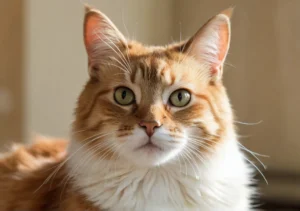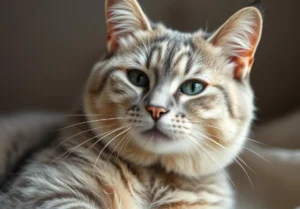Do you ever wonder why your cat emits tiny squeaks while purring? It’s a common question among cat owners, and the answer might surprise you. Understanding why your furry friend makes these noises can give you insight into their unique behaviors and communication methods.
Cats squeak when they purr in response to strong emotions, such as excitement or contentment. This combination of purring and squeaking is their way of expressing intense feelings towards their owners or surroundings.
The Science Behind Purring and Squeaking
Have you ever wondered why your cat makes those adorable squeaks while purring? Well, let’s delve into the fascinating science behind it. Cats actually have a unique laryngeal structure that allows them to purr and squeak simultaneously. Unlike other vocalizations, purring is produced during both inhalation and exhalation, creating a continuous sound that can sometimes be accompanied by squeaks.
Research suggests that these squeaks may be a result of cats’ vocal cords vibrating at a higher frequency. When a cat is in a state of deep relaxation or contentment, their purring may become more pronounced, leading to those delightful little squeaky sounds. It’s a fascinating blend of biology and behavior that makes our feline friends even more intriguing!
Reasons for Squeaking During Purring
There are various situations in which your cat might squeak while purring, each revealing a different aspect of their behavior. When being petted, some cats may emit squeaks to express their pleasure and enjoyment. It’s their way of communicating that they are thoroughly enjoying the attention and affection.
Additionally, cats may squeak while playing as a form of excitement or anticipation. The combination of purring and squeaking during playtime is a sign of their enthusiasm and enjoyment. Moreover, when in a new environment, cats may squeak while purring to signal their curiosity or apprehension. It’s their way of adapting to unfamiliar surroundings and processing the new stimuli around them.
Remember, every cat is unique, so their reasons for squeaking while purring may vary based on their individual personalities and experiences. Keep observing and interacting with your feline companion to better understand their vocalizations and behavior.
Cat Breeds Known for Squeaking
Certain cat breeds are more prone to squeaking while they purr, such as the Siamese, Korat, and Oriental breeds. These breeds are known for being more vocal than others, so it’s not unusual for them to express their contentment through squeaks when purring. The Siamese, in particular, is famous for its chatter and vocalizations, including squeaky purrs. Breed characteristics like high energy levels, sociability, and intelligence may contribute to their tendency to squeak while purring. If your cat belongs to one of these breeds, their squeaking may simply be a unique quirk specific to their breed.
Behavioral Insights from Squeaking Cats
When your cat squeaks while purring, they may be trying to communicate their emotions or needs to you. These vocalizations can indicate excitement, anxiety, or even pain. Pay attention to the context in which your cat squeaks while purring. For example, if they squeak when being petted, it could be a sign of overstimulation. On the other hand, if they squeak during a cuddle session, it might be their way of showing contentment and happiness. Understanding your cat’s body language and vocal cues can help you decipher what they are trying to tell you through their squeaky purrs.
- Tip: If your cat’s squeaking seems to be accompanied by any other concerning behavior, such as lethargy or loss of appetite, it’s best to consult with your veterinarian to rule out any underlying health issues.
Remember, each cat is unique, so while some may squeak while purring, others may not. It’s all part of their individual personalities and communication styles. Embrace your cat’s quirks and enjoy the special bond you share with your squeaky purring feline friend!
How to Respond to a Squeaking Cat
If your cat squeaks while purring, it may indicate they are experiencing discomfort or pain. It’s essential to observe your cat’s behavior closely and consult a veterinarian to rule out any underlying health issues. Providing a calm and soothing environment, along with gentle petting or comforting words, can help alleviate any stress your cat may be feeling. Remember, every cat is unique, so be patient and attentive to their needs to ensure their well-being.
Interesting Facts About Cat Vocalizations
Did you know that cats use a variety of vocalizations to communicate with humans and other animals? From meows and purrs to chirps and hisses, each sound serves a different purpose. For example, a purring cat may indicate contentment or relaxation, while a meow could be a request for attention or food. Understanding these vocal cues can help strengthen the bond between you and your feline friend. If you’re curious about learning more, you can explore the rich world of cat communication through resources like the American Association of Feline Practitioners (AAFP).
- Cats can produce over 100 different sounds, each with its unique meaning.
- Kittens meow to communicate with their mother, but adult cats typically reserve meowing for communicating with humans.
- Cats can use vocalizations to express a wide range of emotions, from happiness and affection to fear and agitation.
Remember, cats have a fascinating way of expressing themselves through their vocalizations, so paying attention to these sounds can deepen your understanding of your cat’s needs and feelings.
The Bond Between You and Your Squeaking Cat
Have you ever wondered why your cat squeaks when he purrs? Well, that adorable sound might actually be your cat’s unique way of showing affection and forming a special bond with you. Cats are known for their ability to communicate with their humans in subtle ways, and squeaking while purring could be your cat’s way of expressing happiness and contentment in your presence.
When your cat makes that cute squeaking noise while purring, it could be a sign that he feels safe, comfortable, and loved. This behavior might be more common in certain breeds or individual cats who are especially attached to their owners. So, the next time you hear your furry friend squeaking away, take it as a sign that your bond with your cat is strong and special.
Remember, every cat is unique, and they all have their own ways of expressing themselves. So, cherish those sweet squeaks from your purring feline companion as a sign of the deep connection you share.
Tips for Understanding Your Squeaking Cat
- Pay attention to your cat’s body language when he squeaks while purring. It can help you understand the context and emotions behind this behavior.
- Try interacting with your cat in different ways to see if the squeaking is triggered by specific actions or situations.
- Consult with your veterinarian if you notice any sudden changes in your cat’s behavior, including excessive squeaking or vocalizations while purring. It’s essential to rule out any underlying health issues that may be causing these sounds.
Remember, every cat is a unique individual with their own quirks and behaviors. Embrace the special bond you share with your squeaking cat and enjoy the love and companionship they bring into your life.
Alex, a passionate animal lover, has experience in training and understanding animal behavior. As a proud pet parent to two dogs and three cats, he founded AnimalReport.net to share insights from animal experts and expand his knowledge of the animal kingdom.




